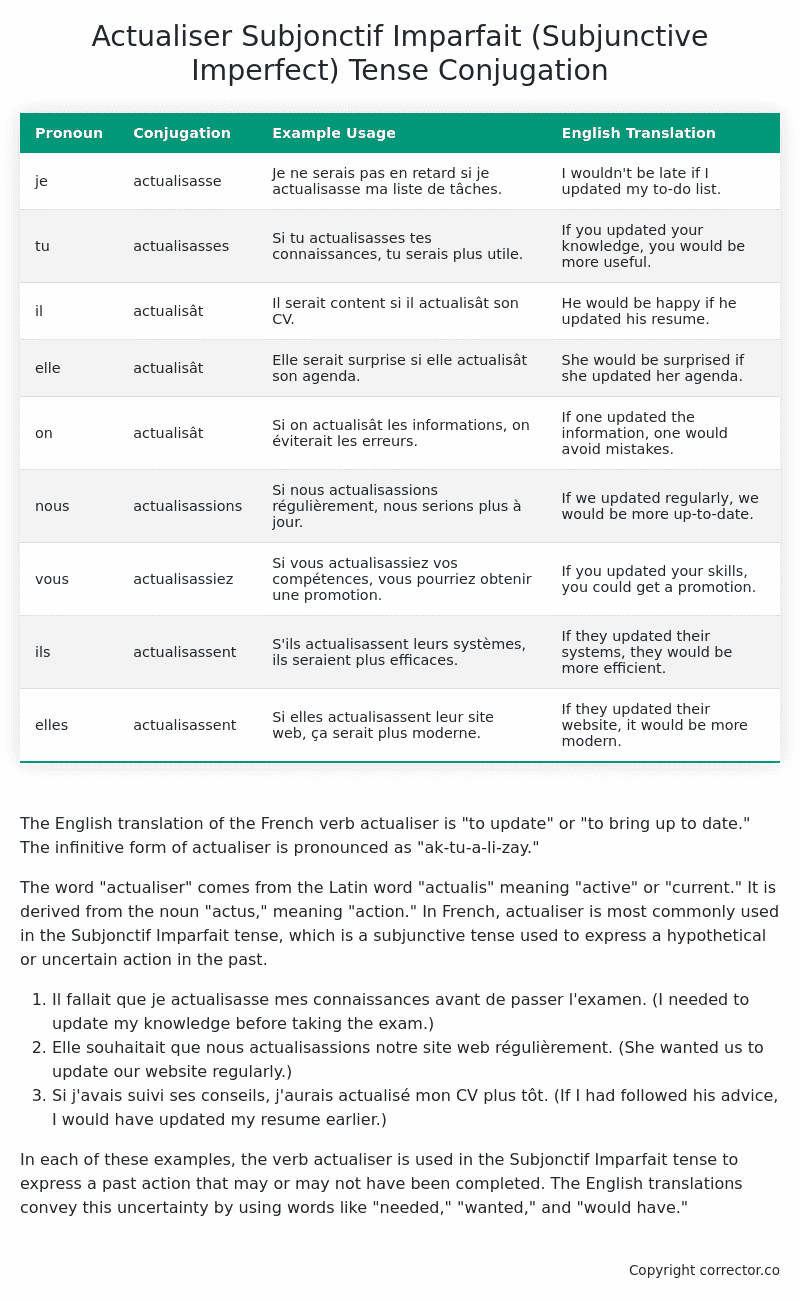Subjonctif Imparfait (Subjunctive Imperfect) Tense Conjugation of the French Verb actualiser
Introduction to the verb actualiser
The English translation of the French verb actualiser is “to update” or “to bring up to date.” The infinitive form of actualiser is pronounced as “ak-tu-a-li-zay.”
The word “actualiser” comes from the Latin word “actualis” meaning “active” or “current.” It is derived from the noun “actus,” meaning “action.” In French, actualiser is most commonly used in the Subjonctif Imparfait tense, which is a subjunctive tense used to express a hypothetical or uncertain action in the past.
- Il fallait que je actualisasse mes connaissances avant de passer l’examen. (I needed to update my knowledge before taking the exam.)
- Elle souhaitait que nous actualisassions notre site web régulièrement. (She wanted us to update our website regularly.)
- Si j’avais suivi ses conseils, j’aurais actualisé mon CV plus tôt. (If I had followed his advice, I would have updated my resume earlier.)
In each of these examples, the verb actualiser is used in the Subjonctif Imparfait tense to express a past action that may or may not have been completed. The English translations convey this uncertainty by using words like “needed,” “wanted,” and “would have.”
Table of the Subjonctif Imparfait (Subjunctive Imperfect) Tense Conjugation of actualiser
| Pronoun | Conjugation | Example Usage | English Translation |
|---|---|---|---|
| je | actualisasse | Je ne serais pas en retard si je actualisasse ma liste de tâches. | I wouldn’t be late if I updated my to-do list. |
| tu | actualisasses | Si tu actualisasses tes connaissances, tu serais plus utile. | If you updated your knowledge, you would be more useful. |
| il | actualisât | Il serait content si il actualisât son CV. | He would be happy if he updated his resume. |
| elle | actualisât | Elle serait surprise si elle actualisât son agenda. | She would be surprised if she updated her agenda. |
| on | actualisât | Si on actualisât les informations, on éviterait les erreurs. | If one updated the information, one would avoid mistakes. |
| nous | actualisassions | Si nous actualisassions régulièrement, nous serions plus à jour. | If we updated regularly, we would be more up-to-date. |
| vous | actualisassiez | Si vous actualisassiez vos compétences, vous pourriez obtenir une promotion. | If you updated your skills, you could get a promotion. |
| ils | actualisassent | S’ils actualisassent leurs systèmes, ils seraient plus efficaces. | If they updated their systems, they would be more efficient. |
| elles | actualisassent | Si elles actualisassent leur site web, ça serait plus moderne. | If they updated their website, it would be more modern. |
Other Conjugations for Actualiser.
Le Present (Present Tense) Conjugation of the French Verb actualiser
Imparfait (Imperfect) Tense Conjugation of the French Verb actualiser
Passé Simple (Simple Past) Tense Conjugation of the French Verb actualiser
Passé Composé (Present Perfect) Tense Conjugation of the French Verb actualiser
Futur Simple (Simple Future) Tense Conjugation of the French Verb actualiser
Futur Proche (Near Future) Tense Conjugation of the French Verb actualiser
Plus-que-parfait (Pluperfect) Tense Conjugation of the French Verb actualiser
Passé Antérieur (Past Anterior) Tense Conjugation of the French Verb actualiser
Futur Antérieur (Future Anterior) Tense Conjugation of the French Verb actualiser
Subjonctif Présent (Subjunctive Present) Tense Conjugation of the French Verb actualiser
Subjonctif Passé (Subjunctive Past) Tense Conjugation of the French Verb actualiser
Subjonctif Imparfait (Subjunctive Imperfect) Tense Conjugation of the French Verb actualiser (this article)
Subjonctif Plus-que-parfait (Subjunctive Pluperfect) Tense Conjugation of the French Verb actualiser
Conditionnel Présent (Conditional Present) Tense Conjugation of the French Verb actualiser
Conditionnel Passé (Conditional Past) Tense Conjugation of the French Verb actualiser
L’impératif Présent (Imperative Present) Tense Conjugation of the French Verb actualiser
L’infinitif Présent (Infinitive Present) Tense Conjugation of the French Verb actualiser
Struggling with French verbs or the language in general? Why not use our free French Grammar Checker – no registration required!
Get a FREE Download Study Sheet of this Conjugation 🔥
Simply right click the image below, click “save image” and get your free reference for the actualiser Subjonctif Imparfait tense conjugation!

Actualiser – About the French Subjonctif Imparfait (Subjunctive Imperfect) Tense
Formation
Common Everyday Usage Patterns
Interactions with Other Tenses
Subjonctif Présent
Indicatif Passé Composé
Conditional
Conditional Perfect
Summary
I hope you enjoyed this article on the verb actualiser. Still in a learning mood? Check out another TOTALLY random French verb conjugation!


